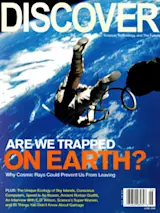There's been a resurgence of discomfort with science, bubbling up from both conservative religious quarters and New Age movements. From the times of Galileo through the 1960s or so, the philosophical debate mostly involved God. Something has changed. We've entered a more selfish era, and with it has come a new challenge. The concern with God has been joined by anxiety over the nature of personhood.
In the mid-20th century, scientists like John von Neumann and Alan Turing presented the world with a new framework for explanation. Suddenly, the mind could be interpreted with a technological metaphor: the computer. The phantasmagorical ideas of Freud have since been replaced by crisper notions supported by personal experiences with a ubiquitous gadget. People are simulated in video games, so it's not too hard to imagine real people as components of a higher-resolution video game. One hears a bit of goading in the way some scientists and technologists, including Steven Pinker, Ray Kurzweil, Marvin Minsky, and others, have tried to challenge the notion that individuals are too special to be understood like any other phenomena.
Humility is valuable in science. Even when a scientific idea is true, it can be misused through grandiosity. Your body has a gravitational field, but that doesn't mean that studying physiology can teach you about black holes. It should be uncontroversial to state that the human brain is only partially understood. Certain mental phenomena might be explained and modeled with computers; the most fashionable candidates at the moment envision thoughts competing in the brain like organisms in the wild. But entirely new dynamics may well be needed to explain what brains can do.
The intellectual groundwork for a truce about God was laid down long ago by 18th-century German philosopher Immanuel Kant and many others: Everyone who considers the matter carefully and honestly comes to the conclusion that you can't prove anything about God with science or logic. God is a matter of faith. A great many people, however, believe that consciousness exists—that there's some sort of self or singularity that is the beholder of subjective experience. I must say, I experience myself as being this way. But it seems to me that it's almost impossible to say anything more than that. Saying that subjective experience is an illusion says nothing. Consciousness is precisely the only thing that is just as real if it's an illusion.
In other words, consciousness controversies can be finessed in just the same way as arguments about God. You can't reason about consciousness or perform experiments. It therefore presents another awkward but workable opportunity for cultural compromise—for scientists to stop the goading and for people who care about whether the self is "special" to recognize that there's no threat from science.
To make clear the potential for compromise, and to examine the extent to which we can or can't define consciousness, I offer two dueling thought experiments. The first one has been around a long time. While no one seems to be absolutely sure who told it first, the master teller is unquestionably the philosopher Daniel Dennett, who, not coincidentally, is also one of the staunchest critics of religious belief of our time. Here's how it goes:
Imagine a computer program that can simulate a neuron, or even a network of neurons. (Such programs have existed for years and in fact are getting quite good.) Now imagine a tiny wireless device that can send and receive signals to neurons in the brain. Crude devices a little like this already exist; years ago I helped Joe Rosen, a reconstructive plastic surgeon at Dartmouth Medical School, build one—the "nerve chip," which was an early attempt to route around nerve damage using prosthetics.
To get the thought experiment going, hire a neurosurgeon to open your skull. If that's an inconvenience, swallow a nano-robot that can perform neurosurgery. Replace one nerve in your brain with one of those wireless gadgets. (Even if such gadgets were already perfected, connecting them would not be possible today. The artificial neuron would have to engage all the same synapses—around 7,000 on average—as the biological nerve it replaced.)
Next, the artificial neuron will be connected over a wireless link to a simulation of a neuron in a nearby computer. Every neuron has unique chemical and structural characteristics that must be included in the program. Do the same with your remaining neurons. There are between 100 billion and 200 billion neurons in a human brain, so even at only a second per neuron, this will require tens of thousands of years.
Now for the big question: Are you still conscious after the process has been completed? Furthermore, because the computer is completely responsible for the dynamics of your brain, you can forgo the physical artificial neurons and let the neuron-control programs connect with each other through software alone. Does the computer then become conscious? If you believe in consciousness, is your consciousness now in the computer, or perhaps in the software? The same question can be asked about souls, if you believe in them.
Here's the second thought experiment, which I cooked up in the mid-1990s. It addresses the same question from the opposite angle. Instead of changing the program running on the computer, it changes the design of the computer. First, imagine a marvelous technology: an array of flying laser scanners that can measure the trajectories of all the hailstones in a storm. The scanners send all the trajectory information to your computer via a wireless link. What would anyone do with this data? Read on.
As luck would have it, there's a wonderfully geeky store in this thought experiment called the Ultimate Computer Store, which sells a great many designs of computers. In fact, every possible computer design that has fewer than some really large number of logic gates is kept in stock. You arrive at the Ultimate Computer Store with a program in hand. A salesperson gives you a shopping cart, and you start trying out your program on various computers as you wander the aisles. Once in a while you're lucky, and the program you brought from home will run for a reasonable period of time without crashing on a computer. When that happens, you drop the computer in the shopping cart.
For a program, you could even use the hailstorm data. Recall that a computer program is nothing but a list of numbers; there must be some computers in the Ultimate Computer Store that will run it! The strange thing is that each time you find a computer that runs the hailstorm data as a program, the program does something different. After a while, you end up with a few million word processors, some amazing video games, and some tax preparation software—all the same program as it happens to run on different computer designs. This takes time; in the real world the universe probably wouldn't support conditions for life long enough for you to make a purchase. But this is a thought experiment, so don't be picky.
The rest is easy. Once your shopping cart is filled with a lot of computers that run the hailstorm data, settle down in the store's café. Set up the computer from the first thought experiment, the one that's running a copy of your brain. Now go through all your computers and compare what each one does with what the computer from the first experiment does. Do this until you find a computer that runs the hailstorm data as a program equivalent to your brain.
How do you know when you've found a match? There are endless options. For mathematical reasons, you can never be absolutely sure of what a big program does or if it will crash, but if you found a way to be satisfied with the software neuron replacements in the first thought experiment, you have already chosen your method to approximately evaluate a big program. Or you could find a computer in your cart that interprets the motion of the hailstorm over an arbitrary period of time as equivalent to the activity of the brain program over a period of time. That way, the dynamics of the hailstorm are matched to the brain program beyond just one moment in time.
After you've done all this, is the hailstorm now conscious? Might it have a soul? My point is that you can neither reason nor design experiments to study core beliefs about the self or consciousness. There is no marker of consciousness but consciousness itself (if it exists), so if you try to define an experiment, you have to arbitrarily decide whether your object of study is a computer on your desk, some tissue in your head, or a hailstorm.
Dan Dennett and I have argued about this idea over the years. He takes the view that consciousness is a cognitive illusion and a nuisance; jettison consciousness and it's easier to design an airtight philosophy. What Dan sees as a road to clarity, though, seems to me to be taking the easy way out. He worries that ideas about consciousness and other matters of faith pave the way to weird and dangerous superstitions. While I share that concern, I take a more accepting view. Consciousness is a loose end, and it takes discipline to live with loose ends. Dispelling the idea of consciousness (or religion) doesn't necessarily dispel what Dan fears are divisive beliefs, like dreams of everlasting life. Some of my nonreligious computer science colleagues, like Ray Kurzweil, hope to cheat death by backing themselves up on a computer, along the lines described in the first thought experiment.
In the end, a sense of humor is essential in these matters. Dan Dennett still thinks I'm wrong and that consciousness is an illusion. I've accused him, with tongue in cheek, of being one of those unusual people who just happen not to have consciousness.
Previous Jaron's World columns:
I Smell, Therefore I Think(May, 2006)
Why Not Morph?(April, 2006)














